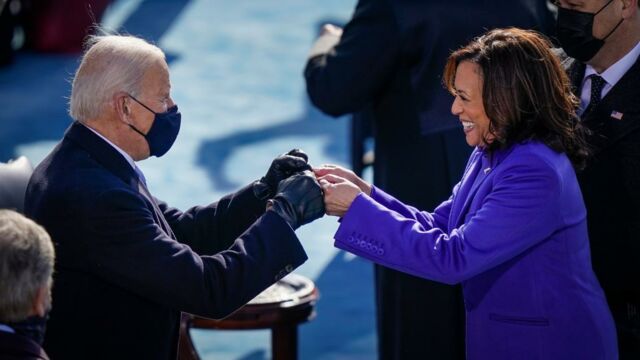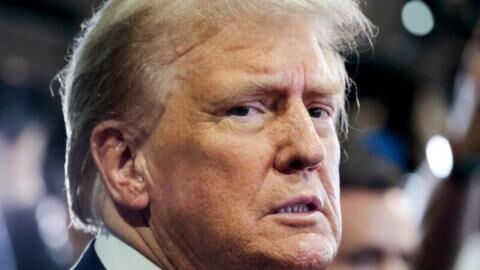‘There’s no time to start like today’ were the words that Biden told to reporters after his inauguration and it looks like he wasn’t messing around. After just one day in office Biden has already started to undo some of the damage done by Trump’s policies including that on climate change and coronavirus.
Discover our latest podcast
And it looks like he’s only just getting started.
How many executive orders did Biden make?
During his presidential speech, Biden announced:
We have much to do in this winter of peril and significant possibilities — much to repair, much to restore, much to heal, much to build and much to gain.
In order to restore some of the damage done to the US in previous years,Biden has issued a total of 15 executive orders for his first day in office. That’s more than any president in recent years. In 2016, Trump carried out 8 executive orders in his first two weeks while Obama carried out nine. Bush and Clinton each executed 2-3 orders in their first two weeks, which shows that Biden is serious about making changes in regards to the pandemic as well as issues on the environment and immigration.
We are currently facing four converging crises — COVID-19, the resulting economic crisis, climate change, and racial inequity. Today, President Biden took actions to combat these challenges. pic.twitter.com/091jmvCukk
— The White House (@WhiteHouse) January 21, 2021
What were Biden’s first executive orders?
Coronavirus response
In his initial acts as the 46th President of the United States, Joe Biden signed 15 executive orders. The first of which was to boost the federal response to the coronavirus pandemic, with masks and social distancing now required on all government property.
The new President has also signed off for a new office to be set up to coordinate the pandemic response. As well as halting the movements of Trump to have the US withdrawn from the World Health Organisation. The move to re-engage with the WHO has been labelled as ‘absolutely necessary’ for a unified global response to the pandemic.
Today, @POTUS issued a mask mandate on federal property, launching his “100 Day Masking Challenge” as part of our efforts to flatten the COVID-19 curve. pic.twitter.com/NLGr6JHB0h
— The White House (@WhiteHouse) January 21, 2021
Environmental policies
Biden has also made immediate actions to target Trump’s environmental policies, calling for a review of all legislation that could cause damage to the environment or to public health.
The POTUS has also signed an executive order to begin the process of rejoining the 2015 Paris Agreement,which Trump withdrew the US from last year. Biden’s climate envoy John Kerry tweeted about the efforts stating that they are setting a ‘floor not a ceiling’ in terms of climate response:
Today, @POTUS rejoined the Paris Climate Agreement, restoring America’s credibility and commitment — setting a floor, not a ceiling, for our climate leadership. Working together, the world must and will raise ambition. It’s time to get to work - the road to Glasgow begins here.
Today, @POTUS rejoined the Paris Climate Agreement, restoring America’s credibility and commitment — setting a floor, not a ceiling, for our climate leadership. Working together, the world must and will raise ambition. It’s time to get to work - the road to Glasgow begins here.
— Special Presidential Envoy John Kerry (@ClimateEnvoy) January 20, 2021
The Keystone XL Pipeline
Next on the list was reversing Trump’s approval for the controversial Keystone XL Pipeline. The pipeline has been the source of tension for Native American and environmentalists groups for over a decade. The first efforts will be brought up during Biden’s first call to Canadian PM Justin Trudeau.
The eight billion-dollar pipeline set to run crude oil from Alberta to Nebraska was initially vetoed by former President Barack Obama but was eventually overturned by Trump.
Immigration and ‘The Wall’
When it comes to immigration Biden made moves to revoke the Trump administration's emergency declaration to build the wall along the border between the US and Mexico. Then, the POTUS released the travel ban that previously restricted many Muslim majority countries from engaging in immigration.
Biden has also sought to fortify Obama’s previous DACA or deferred action for childhood arrivals initiative, which will ensure that young immigrants will be protected from deportation and have a clear pathway for citizenship. This is only one point of Biden’s larger plan that could see citizenship given to 11 million illegal immigrants through an eight-year pathway.
However, Biden can expect to see fierce opposition on this goal. Spokesperson for the National Republican Senatorial Committee, Chris Hartline stated that the eight-year pathway would result in ‘a permanent cycle of illegal immigration and amnesty that would hurt hard-working Americans and the millions of legal immigrants working their way through the legal immigration process.’
Racial Equity
Biden has also not been deaf to the heightening racial tension that has erupted in the US over recent years and has made it part of the policy of his administration to ‘pursue a comprehensive approach to advancing equity for all, including people of colour and others who have been historically underserved, marginalized, and adversely affected' by persistent poverty and inequality.’
Biden has also reversed Trump’s previous decision to ban diversity training involving the use of critical race theory or the highlighting of institutional racism for agencies and federal contractors.
Biden’s new plans involve all federal agencies to conduct internal reviews and devise plans to ‘address unequal barriers to opportunity in agency policies and programs.’ The reviews are also intended to not only address racial equity, but also that based on sexual orientation, gender identity, religious minorities as well as disability.
The executive order also rescinds Trumps 1976 commission, an effort that had set out to limit the education on slavery and other racial injustices in American history courses.
All federal employees will also now have to undertake a new ethics pledge to uphold the independence of the justice department and not to act in personal interest.















